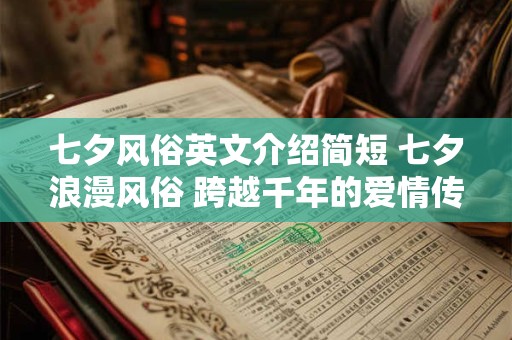As the summer sky grows darker and the stars begin to twinkle, the ancient Chinese festival of Qixi, also known as the七夕节, celebrates love in all its romantic splendor. This festival, rich in tradition and symbolism, has stood the test of time, weaving a tapestry of love and romance that transcends generations.
Qixi Festival Origins: The Star-crossed Lovers
The Qixi Festival has its roots in a tragic love story that dates back over two millennia. According to legend, a cowherd named Niulang and a weaver girl named Zhinü were inseparable until celestial powers separated them. They were allowed to reunite once a year on the seventh day of the seventh lunar month, which is when the Qixi Festival is celebrated. Their enduring love has inspired countless stories and rituals over the centuries.
Preparations for Romance: Pre-Qixi Rituals
In the days leading up to the Qixi Festival, families across China begin their preparations for the romantic celebration. Women often braid their hair into a special style known as the "Seven Star Braid," symbolizing the connection between them and the celestial couple. They also make offerings to the heavens, including fruits, candies, and tea, in hopes of attracting a good match.
The Festival Evening: Celebrating Love
On the night of the Qixi Festival, families and lovers gather to enjoy a night filled with tradition and romance. Here are some of the highlights:
1. Star Gazing: The Celestial Bridge
As the night sky clears, people of all ages gather to gaze at the stars, particularly the brightest two—Altair and Vega—which represent Niulang and Zhinü. Many believe that those who watch the stars will be blessed with love in the year ahead.
2. Offering to the Weaving Goddess
It's common to place offerings on an altar or in the backyard to honor Zhinü, the celestial weaver. These offerings include fruits, tea, and sweets, which are believed to strengthen the bond between couples and ensure good health and happiness.
3. The Qixi Riddle Game
Young women often participate in the Qixi Riddle Game, where they are asked to solve riddles. The origin of this game dates back to the weaver girl Zhinü, who was skilled in solving riddles. Those who solve the most riddles are said to be blessed with intelligence and a lucky match.
4. Matchmaking: Finding a Partner
The Qixi Festival is also considered a lucky time for matchmaking. Families and friends often exchange love tokens, such as red strings or candies, to symbolize their desire for a successful partnership.
5. Qixi Festival Decorations: The Heart Shaped Lantern
The most iconic Qixi Festival decoration is the heart-shaped lantern. These lanterns, made from bamboo and silk, are often adorned with red ribbons and inscribed with the names of couples hoping to find love.

The Modern Qixi Festival
In today's fast-paced world, the Qixi Festival has adapted to new customs, while still holding onto its traditional essence. Couples often take romantic dates, exchange heartfelt gifts, and share their love stories with friends and family.
Qixi Festival Celebrations Across China
From the bustling city of Shanghai to the remote countryside of rural China, the Qixi Festival is celebrated in various ways. Here are some examples of regional customs:
1. Shanghai: The City of Love
Shanghai hosts the "Qixi Love Festival," a grand celebration featuring lantern displays, love-themed events, and a chance for single men and women to find partners.
2. Guizhou: The Weaving Festival
In the province of Guizhou, the Qixi Festival is known as the Weaving Festival, where women gather to weave beautiful fabrics, hoping to attract a suitable husband.
3. Shanxi: The Star Lantern Festival
In Shanxi province, people make star lanterns, which are then released into the sky, symbolizing the love and longing between Niulang and Zhinü.
Conclusion: The Timeless Love of Qixi
The Qixi Festival, with its rich history and romantic customs, continues to captivate the hearts of people around the world. Whether through star-gazing, exchanging love tokens, or sharing a tender moment with a loved one, the spirit of this ancient festival lives on, a timeless reminder of the enduring power of love.
